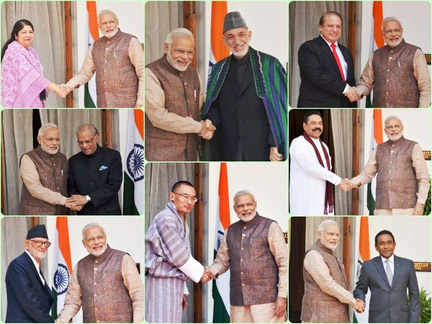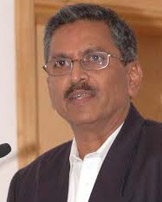|
Presence of heads of SAARC countries at swearing-in
ceremony:
Masterstroke in diplomacy
By Manjula Fernando
Executive Editor of the Deccan Chronicle, Chennai, R Bhagwan Singh
who had covered Sri Lanka since the 1980s, including being a
correspondent for The Week, in an exclusive email interview with the
Sunday Observer said having two strong governments in Colombo and Delhi
with the muscle to talk and sort things out, the haze of uncertainty
which engulfed the path of future relations between the two countries
will soon be lifted.
|

SAARC leaders wish Indian premier Narendra Modi |
"There are many in India, even in the rabidly anti-Sinhala Tamil Nadu
segments, who strongly believe that Narendra Modi and Mahinda Rajapaksa
can repair the cracked relations between their countries through mutual
trust and cooperation, and by looking forward rather than stay bogged
down by the past."
The full interview,
Narendra Modi could not have started on a better note, a stronger
footing. The decision to invite all the Heads of the SAARC countries to
his swearing-in ceremony was a masterstroke in positive diplomacy and
demonstrated how serious the 15thPrime Minister of the largest democracy
in the world is about bonding India with her neighbours. It was pretty
obvious he had decided on this even before his political aides and
personal astrologers set the date for the swearing-in ceremony.
After all, all the neighbours shared an umbilical cord relationship
dating back to several centuries. Everyone realises that it's not just
futile but even dangerous to continue with the differences that have
cropped up over a variety of issues-from very petty to pretty
serious-and allowed to grow to Himalayan dimensions. Modi sought to
stress this on the very day of his assuming office.
Experts in international relations have been quick to interpret
Modi's invitation to the SAARC partners as a signal to the world, to
China in particular, that India is the unchallenged leader of the South
Asian region. Prime Minister Tshering Tobgay spoke for all when he told
reporters that the swearing-in ceremony was "like a mini SAARC summit".
Modi did not stop with that 'SAARC summit'. Just a couple of days
later, on May 29 to be specific, he did two very important things. He
held a Cabinet meeting and set 10 priorities for his Ministers to
deliver in 100 days to energize the Indian economy. On the external
front, he had a telephone conversation with Chinese Premier Li Keqiang
about the need to strengthen Indo-Chinese relations.
|

R Bhagwan Singh |
That would go a long way in helping the country's long-time strategy
to build friendship with China, develop strong relationships in the
South East Asian region and attract big investments from Japan. The
Americans can wait; they were not nice to him anyway.
Across the border in Pakistan, reactions were mixed though a good
majority appearing on the TV screens and the pages of the newspapers
seemed upset that the new Prime Minister in Delhi appeared to be flexing
muscle and reaffirm that India remained the Big Bullying Brother. "We
saw Shariff look distinctly uncomfortable on this trip and even sport a
strained frown, perhaps worried about the TV viewers back home. But
there is definite progress and that's an achievement happening within 24
hours of a new government taking charge. You must have noticed that the
usual rhetoric on rights violations in Kashmir did not happen", said an
official in Delhi.
Modi's meeting with Sri Lankan President Mahinda Rajapaksa was less
dramatic, even though it had all its dose of excitement much before it
took place.
BJP's ally and MDMK general secretary Vaiko had stoutly objected to
Modi inviting Rajapaksa despite the Tamils' charge that Colombo was
guilty of war crimes.
Vaiko not only boycotted the swearing-in ceremony but also led a
high-decibel protest march in Delhi and was held in police custody until
a couple of hours after the oath ceremony got over. The other allies,
PMK and DMDK, were not that loud in their demonstrating anger at the
invitation to the Sri Lankan President, though they did issue protest
statements.
Tamil Nadu chief minister Ms Jayalalithaa had issued a strongly
worded two-page statement on May 22 expressing 'dismay' at the reports
that President Rajapaksa was invited for the swearing-in ceremony. She
had even made a veiled threat in it saying that the coming of Rajapaksa
could jeopardize relations between her government and the new Modi
regime.
But Modi remained firm that none-be it an ally like Vaiko or a friend
such as Jayalalithaa-would be able to arm-twist him when it came to
national interests.
The message was crystal clear--foreign affairs would remain the sole
concern of the Union Government and the States cannot dictate; that era
of bullying Manmohan Singh was dead and buried.
Modi went ahead with his SAARC gathering at the swearing-in and the
subsequent one-to-one sessions with the dignitaries, in a manner that
seemed to convey to the visitors that it was time the region woke up to
its huge positive potential instead of staying stranded in aged
conflicts kept alive by the dangerous pursuit of self-interests by some
leaders. His meetings with Nawar Sheriff and Mahinda Rajapaksa also
strengthened Modi's public image in his country as a tough negotiator
with the most beguiling smile.
Official sources in Delhi say that Modi pressed for a quick solution
to the Tamil problem-devolution of powers through the promised 13th
Amendment Plus and pulling out the armed forces from Tamil areas were
the most important topics-and the Sri Lankan President said he was doing
his best. And when he boarded the Sri Lankan Airlines plane for the
flight back home, the President must have been happy, relieved; for it
is said that his security advisors had warned him Modi would be a bad
customer and the tenuous relations with India were sure to sour further.
Minister Nimal Siripala de Silva later summarized well his
government's response to the President's Delhi visit-'it was a very
successful first meeting' that proved wrong what 'some' had predicted
that Colombo would have problems with the BJP government unlike the
predecessor Congress regime. But then, on issues such as the 13th
Amendment, Sri Lanka is capable of finding solutions "to our own
problems in our own ways". The post-Jayawardene stand in the Sri Lankan
administration has been that the 13th Amendment to devolve authority to
the provinces was thrust upon Sri Lanka by the Rajiv Gandhi regime and
it was unacceptable now. The way forward would be through the
Parliamentary Select Committee.
Colombo, said the officer (he cannot be identified as per rules),
"cannot be actually blamed" for closing one eye to the ISI activities.
The anti-Sinhala jingoism peddled repeatedly by the politicians and
so-called Tamil nationalists in Tamil Nadu has badly damaged the
relations between the majority Sinhala people and India, thanks to the
anti-Colombo stand taken by the state government and the helplessness of
the Manmohan regime that depended on its Tamil allies for survival.
"Even bikkus on pilgrimage were attacked in Tamil Nadu and teenage
students coming for sports were sent back. The Sinhala pride was deeply
hurt.
There is lot of repairing to be done and we think this Modi
Government will not hesitate to try setting things right even while
pressing for a solution for the Tamils, and even if some precious
feathers get ruffled in Chennai", said the official, pointing to the
manner in which Modi brushed aside the Tamil Nadu opposition to
President Rajapaksa's presence at his oath ceremony.
Sri Lanka, recalled another senior official, had justification
turning to Pakistan and China during the critical phase of its war
against the Tigers because Delhi was unable to help with logistics and
hardware because of the Tamil Nadu factor. "But now the war is over and
Colombo should understand that its interests are safer with us rather
than the others, particularly with Narendra Modi as PM. He is a
no-nonsense man and truly believes that India can develop only alongside
her neighbours and not in isolation. We must help each other".
TNA leader Dharmalingam Sidharthan, who was in Chennai a few days ago
and shared tea and some thoughts with me as an old friend, expressed
happiness at Modi's SAARC masterstroke. "He is starting on a good note.
Tamil people expect a lot of help from the new Indian PM. If he starts
with contradictions with neighbours, things would be difficult.
Holding hands with Rajapaksa only increases the President's
responsibility and he will feel the urge to deliver. This is a fresh
start and a new plank", said Sidharthan, a member of the Northern
Provincial Council.
A young BJP functionary in Tamil Nadu, R Kalyanaraman told me soon
after the Rajapaksa trip that it is necessary to delink the allegations
of war crimes from the compulsion to strengthen ties with Colombo.
"Evolution of foreign policy should have a 360-degrees comprehensive
strategy and not get stuck to just one event, one emotive issue (Eelam
war).
People sitting in Tamil Nadu, who have never raised voice when there
was genocide and Pakistan-managed terrorism, have no business to
question our (BJP) government's credentials in framing its long-term
vision for foreign relations beneficial to India and the region", said
Kalyan, former national secretary of the Bharatiya Janata Mazdoor
Mahasangh (BJMM).
There are many in India, even in the rabidly anti-Sinhala Tamil Nadu
segments, who strongly believe that Narendra Modi and Mahinda Rajapaksa
can repair the cracked relations between their countries through mutual
trust and cooperation, and by looking forward rather than stay bogged
down by the past. Chaiwallah (tea-seller) Modi has clawed up the BJP
ladder hitherto controlled by the upper castes and is demonstrating his
determination to work for the national and regional good, uncaring even
if some political partner scream and wail. He is unlikely to let the
Tamil Nadu pressures to come in his way of mending fences with Colombo.
"Modi is an awesome person. We are confident India has a great future
because this man has the vision and he is a patriot", said president
Abdul Ghani of Youth Exnora International, a Muslim youth who has been
spearheading several social service projects in Tamil Nadu.
Mahinda Rajapaksa too sweated it out in multiple wars against
terrorism to emerge the winner, including the battle of Mullivaikal, and
is known to take his decisions in a clever and pragmatic manner. My
long-time friend and Sri Lankan minister Douglas Devananda, while
speaking to me a couple of days back, summed up the aspirations and
responsibilities on both the sides-Sinhalas and Tamils, Sri Lankans and
Indians. He said, "Modi is a strong leader and shows independent ways of
thinking and deciding. President Rajapaksa too is a strong-willing
leader.
Both of them have majority in their Parliaments and have the muscle
to talk to sort out differences without external and internal pressures.
We are hopeful". The EPDP chief recalled that Nelson Mandela had
advocated that to resolve the bitterest of conflicts, one must talk to
the enemy. |

